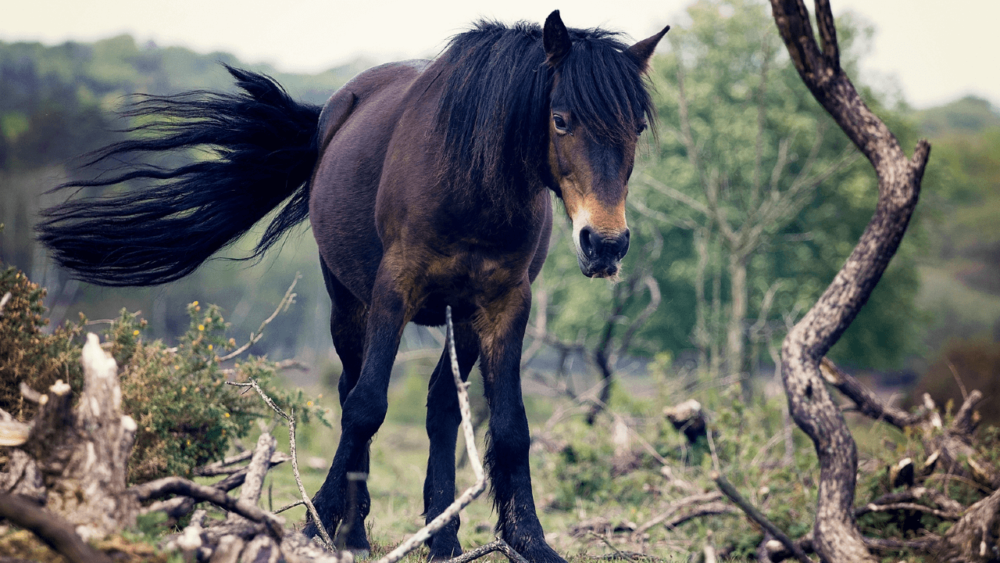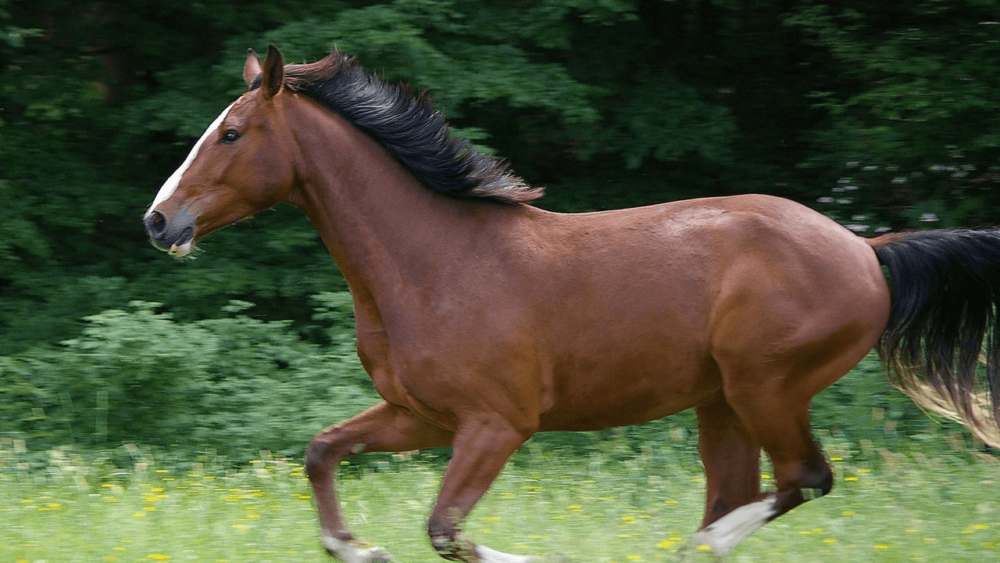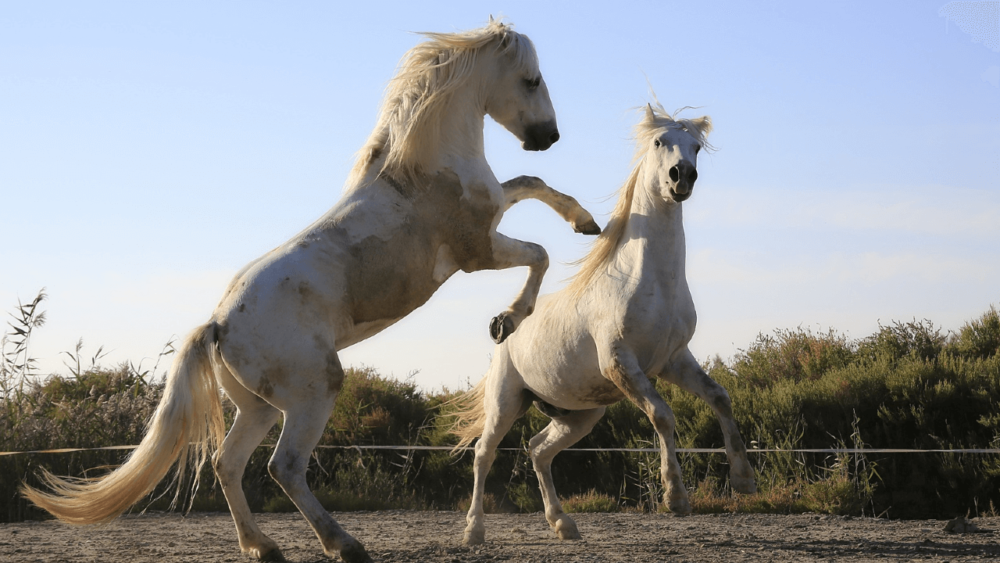Horses are naturally sensitive animals. And, spooked horses are dangerous. When your horse seems overly jumpy and jittery, it could also signify that something is wrong.
Why does my horse spook so easily? Horses spook for many reasons. The most common include a lack of confidence, a lack of relationship and trust with the handler, increased stress, and phobias.
There are ten major reasons horses spook easily and become skittish. Each of those causes and the solutions are covered here. It is possible to guide your horse to a calmer disposition. And, in case you find yourself riding a skittish horse, this article covers how to ride a skittish horse safely.
Let’s take a look at the reasons why your horse may be getting spooked so easily and what you can do to calm them down.
Lack Of Confidence
Your horse may be naturally shy because of its past. If they have been socially isolated, abused, or neglected in their past, they may lack the confidence and social skills to handle daily life.
They spook easily as a result. Signs that your horse is naturally shy include being reserved around strangers, other horses, and people that they know.
Your Relationship Impacts Your Horse’s Confidence
Your horse may also be shy or easily spooked around you because they lack trust in you. It’s important for you, as the owner, to build trust with your horse. Check out how you can train a spinning horse and build trust through groundwork here.
Some horses have trust issues due to a bad relationship with a previous owner. Others may have a natural shyness.
There are several signs your horse doesn’t trust you:
- Your horse does not come to you when you reunite
- It does not like you touching it
- Does not follow your queues
- If any of these occur, work on your relationship to build greater trust.
Higher Stress Increases Paranoia
Another cause of jitteriness in horses is stress. Like humans, horses can become skittish when they’re anxious or stressed. Common causes of stress in horses include grief, a change in routine, under-stimulation, poor living or transportation conditions, and emotional trauma.
If your horse is stressed, there are several ways you can physically assess their stress. Physical symptoms of stress in horses include:
- loss of appetite
- weight loss
- gastric ulcers
- tooth grinding
- sweating
- trembling
- an elevated heart rate
- stomach upsets (learn more)
- frequent urination
- a generally weakened immune system
- yawning and repetitive behaviors
- cribbing
- wall kicking
- stall walking
- weaving
- fence walking
Keep reading for advice on what to do if you notice these symptoms.
Horse Phobias Cause Jumpy Reactions
Many animals can have phobias. If your horse is particularly nervous and jittery around a certain place, person, or thing, they may be afraid of it. Bad past experiences usually cause fears and phobias. They can also relate to the unknown. Horses are susceptible animals, so it really only takes one bad experience to create a phobia. Find out how expert trained horses to be umbrella-proof here.
Other signs that your horse may be suffering from a phobia include heavy breathing or snorting, staring at the offending object whilst arching their neck, stomping the hooves, and making zig-zag movements.
Common phobias in horses include crossing water and unexpected stimulation. Things that move suddenly or make strange noises, like snakes and cars, easily startle horses. If a horse experiences something that frightens them in a particular area or with a specific person or object, they may become afraid of it and act skittish around it.
How To Build Your Horse’s Confidence
To build your horse’s confidence, you should try to get them comfortable in their surroundings. Make their living space as secure, comfy, and fun as possible. Take them out and interact with friendly people and other horses to build their social skills if necessary.
To build your horse’s self-confidence, try giving them a problem-solving toy like a food dispenser or some toys to have fun with.
Then, try teaching them some easy tricks like “touch” or “hug” by encouraging the motions with your own body, repeating the commands, and using praise and reward. When they start to learn and have fun by themselves, it will naturally build their self-confidence.
How To Build Trust With Your Horse
Building trust with your horse will take time so that it won’t be a quick fix. To build trust with your horse, you must be willing to put in the time, love, and effort. Here are some top tips on how to build trust with your horse.
When approaching your horse, approach them from the side and avoid direct eye contact if they’re particularly nervous. Hold out your hand and let them come to you and sniff you as you get closer.
If they’re still nervous, try bending slightly to make yourself seem smaller. Animals understand body language and tone of voice. If you’re nervous, try not to communicate this to your horse. Talk to them in a friendly tone of voice and keep your body relaxed.
First of all, to build trust with your horse, you’ve got to be a good leader. You can do this by issuing clear commands, being consistent, and being fair. This establishes respect and rules, which create a sense of security and trust with your horse. You can do this by being firm and consistent during training.
That said, you should also be kind and always reward your horse with lots of praise and treats when they get it right. Never get annoyed when they aren’t understanding or cooperating. Yelling and physically aggressive behavior are never acceptable and will only ruin your bond with your horse.
Although you should be the leader physically, you should be led by them emotionally. Watch their body language to see what their boundaries are and respect them. Take it slow, and don’t rush your horse too much.
When working with a new horse, remember to do the groundwork before riding together. You can do this by teaching them some basics like standing still and leading properly. If the horse already knows how to do these things, practice them anyway and give them many rewards for following your queues to build your bond.
Build trust with your horse by spending time together. You can do this by just hanging out with them when they’re grazing or going for walks together. Brush them daily.
How To Reduce Stress In Horses
Horses experiencing stress from big life changes should receive extra TLC from their owners. More specific triggers like under-stimulation will require you to make some lifestyle changes. Traumatic triggers should be treated with positive association training or be avoided altogether.
Horses should always live safely, secure, clean, and comfortable stables. Stables should be well-ventilated and size-appropriate. Horses need constant access to clean drinking water and a paddock to graze on. Transport should also be clean, safe, and comfortable.
Grass hay provides complete nutrition to horses. Provide your horse with as much access to their paddocks as possible. But, you can also enrich their diet with fruits and vegetables. A well-nourished horse is a lot less likely to experience stress.
Relieve Stress through Play and Companionship
Stress is energy, so be sure to exercise your horse sufficiently to leave less room in their life for stress and anxiety. A healthy adult horse needs about two hours of exercise a day, so it’s important to take them out walking or riding daily.
Horses are very social animals, so living with at least one other horse is necessary. Like all mammals, they also need to play, too. Play will enrich your horse’s life and is a great way to relieve stress.
Horses love toys that can be chased and thrown around, like balls, traffic cones, and even stuffed toys. Mentally stimulating toys like treat dispensers are especially great for stress-busting.
Engaging your horse’s brain by teaching them new tricks will also make them feel more fulfilled, tire them out, and leave a lot less room for stress.
If your horse’s stress is severe, try some anti-anxiety products. Several anti-stress supplements on the market use naturally soothing ingredients like CBD and lavender to reduce stress levels in animals. It’s also well-documented that horses respond to music, so why not try some relaxing tunes to soothe your horse’s anxiety?
How To Help Your Horse Overcome a Phobia
You cannot just expose a horse to a phobia and expect it to go away overnight magically. Overcoming phobias is a long process, and it can be difficult. That said, some phobias don’t need overcoming.
For example, if your horse is afraid of somebody who mistreated them, you should ban the person from your horse’s life.
But, if you are going to cure your horse’s phobia, you must move very slowly, taking time to build positive associations. Let’s look at how you can do this.
For example, let’s say your horse is afraid of crossing water. First, take them somewhere where water is visible from a distance. Go there for a few days in a row. While there, make it a good experience by doing something your horse enjoys. This could be eating a tasty treat or simply spending some quality time together.
Next, go a little closer. Over time, move closer until you are close to the water. Then, introduce it to your horse gradually. You could try paddling in the water in front of them to show them that it’s nothing to worry about. Your horse’s natural curiosity will eventually bring them to the water. Allow them to determine the speed and length of these encounters.
Lead them into the water for a few steps on foot. If they manage a few steps, take them back the next day and try crossing it together with you leading the way, and remember to reward them for every bit of progress they make!
Finally, if they manage to cross the water with you on foot, try riding them through it. Patience is key. Allow your horse plenty of time and experience to learn that water is not dangerous. Consult a behaviorist if you struggle with patience or time to do this. Don’t force it, or you could damage your relationship with your horse.
Medical Causes Of Spooking In Horses
Medical conditions can also cause anxiety and nervousness in horses. The most common medical causes of jumpiness in horses include pregnancy, magnesium deficiency, feed intolerance, and sensory impairment. Pregnancy hormones can make horses behave nervously.
Magnesium deficiency in horses can cause issues with the neural and muscular functions, resulting in the following symptoms:
- Nervousness, excitability, or anxiety
- An inability to relax or focus
- Muscle tremors, spasms, and twitches
- Trembling
Grass-fed horses get the majority, if not all, of their magnesium intake from grass, so not spending enough time in the paddock or being fed the wrong diet can cause magnesium deficiency. Vets usually diagnose it based on symptoms. Thankfully, severe, life-threatening magnesium deficiency is rare in horses, and it’s easily treated with dietary changes and supplements.
Intolerance to feed can also cause jumpy behavior, as well as the following symptoms:
- Hives
- Dry and itchy skin
- Stomach upsets
Common feed allergies and sensitivities in horses arise from improper feed. Horses should eat primarily grass hay. Eating too much alfalfa and clover hay or grains will cause digestive issues.
Occasionally horses may have allergies to specific grass species. If you suspect your horse of having an allergy to their feed, talk to your vet about changing their diet and introduce any new feed gradually to avoid further upsetting their system.
Visual and hearing impairments can also cause jumpiness in horses. When the senses are impaired, animals can become anxious and insecure as they don’t know what’s coming, and they’re easily startled when something seems to appear from nowhere.
Other signs of vision loss in horses include:
- An increase in clumsiness
- General changes to behavior
- Changes to the physical appearance of the eye
- Lack of pupil dilation when light is shone in the eye
There are a lot of congenital, age-related, and trauma-related causes of vision loss that affect between 1-2% of horses. Unfortunately, vision loss is not curable. However, following veterinary examination, your vet will advise you on how to adapt your interactions with your horse, as well as your horse’s life and living space, to make it safe.
Deafness is relatively rare in horses but still possible. There are two types; partial and full deafness. Causes can either be congenital, related to infection, or trauma. Symptoms include:
- Unresponsiveness to verbal queues
- Difficulty with training
- Leaning to one side
- Tilting, rubbing and shaking the head
- Walking strangely
- Corneal ulceration
- Dysphagia
Infection-related deafness is usually treatable with medication, depending on the severity and stage of the infection, but congenital and trauma-related deafness is permanent. Vets will examine and test your horse’s hearing to diagnose the issue and advise you on adapting your horse’s life.
If your horse is acting nervously, try to get to the bottom of why. Work on the issue if you can, and ask your vet for advice if you think they need medical attention.
My Favorite Equine Resources For Horses and Donkeys
This list contains affiliate products. Affiliate products do not cost more but helps to support BestFarmAnimals and our goal to provide farm animal owners with accurate and helpful information.
Squeaky Chicken Toy is hilarious to watch and the horses love it! It’s not super tough so keep it away from dogs.
Dewormer with Ivermectin: I use this for my horses and my goats. Duvet makes a great dewormer. I switch between the Ivermectin one and one like this one so the worms don’t get immune to it.
Manna Pro Apple Flavored Nuggets are a delicious smelling treat that my horses go crazy over.
Equinity Amino Acid Supplement for Horses makes a big difference for any horse that’s struggling with arthritis, hoof issues, or just generally. It’s great for older horses who can’t absorb all the nutrients in their food as well!
Manna Pro Weight Accelerator helps older horses gain weight and stay healthier! This was especially helpful when one of my older horses lost weight over the winter and helped her regain her weight over the summer!
Farnam Fly Control goes on the horse or donkey and will keep the flies off your sweet pet. It makes horses way more comfortable and will keep sores from getting infected as well.
Wound Kote protects sores and wounds. It acts as an antiseptic and helps wounds heal faster. It works on both my horses and goats.



